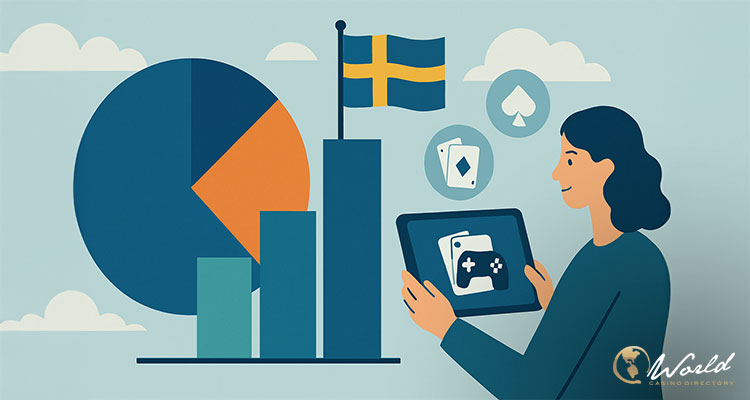Sweden’s gambling regulator Spelinspektionen has released its annual figures showing that the country’s channelization rate slipped to 85% in 2024, down from 86% the previous year. The decline highlights ongoing challenges in steering players toward licensed operators, despite the government’s long-term goal of achieving a 90% rate.
Channelization measures the share of gambling conducted with companies holding a Swedish license, primarily covering betting and online casinos. This year’s assessment introduced an updated methodology that combined player surveys with internet traffic analysis. More than 5,700 individuals participated in the survey, while regulators tracked traffic from over 2,000 unlicensed websites.
According to Spelinspektionen, 96% of Swedish players used licensed platforms at some point during 2024. Still, General Director Camilla Rosenberg stressed that certain gambling segments continue to lag behind: “The channelization rate in 2024 is estimated at 85 percent, which shows that the vast majority of Swedish gambling takes place with operators licensed in Sweden. Only a small share of traffic to unlicensed websites comes from sites that Spelinspektionen, through prohibition orders, has assessed as actively targeting Sweden without the necessary license, that is, illegal gambling.”
Betting Strong, Online Casino Lagging
The figures reveal a clear split between gambling types. Betting, including sports and horse racing, continues to perform strongly, with channelization between 92% and 96%. Online casino, however, remains the weak link, with a rate estimated at just 72% to 82%. At times, reports indicate that this figure has even dipped below 75%.
Spelinspektionen attributes the weaker casino performance to regulatory constraints that make licensed operators less appealing compared to offshore sites. Since the Gambling Act reform in 2019, Sweden has enforced strict bonus restrictions, limiting promotions to a single offer capped at SEK 100. In 2023, additional measures introduced customer care checks for players exceeding certain thresholds of time or money spent.
Survey responses provide further insight into consumer choices. Players cited several reasons for turning to unlicensed platforms: 35% said they believed their chances of winning were higher, 23% had been blocked by the national self-exclusion system Spelpaus, 21% preferred larger bonus offers, and others pointed to the broader game selection found on unlicensed sites.
Industry Calls for Political Action
The Swedish Trade Association for Online Gambling (BOS) has been vocal about the persistent underperformance in the online casino sector. Secretary General Gustaf Hoffstedt criticized the lack of decisive government measures, stating: “With this assessment, the SGA confirms that Sweden’s major problem in the gambling market is online casino. It is unacceptable that around a quarter of all online casino gambling is leaking out of the licensed market. It is equally unacceptable that this has been accepted by political decision-makers for half a decade, since the channelisation has also been low in previous assessments, without effective regulatory measures being taken.”
Hoffstedt argues that strict regulation has unintentionally made the licensed market less attractive to players. “Anyone who understands the gambling market knows that the elephant in the room is that the licensed market is so tightly regulated that it does not appear attractive enough in the eyes of the consumer,” he said. He has urged lawmakers to reconsider restrictions such as the blanket ban on bonuses and loyalty programs, warning that without reform, future assessments will continue to disappoint.
Legislative Review Underway
Later this year, gambling investigator Marcus Isgren is expected to present recommendations on reforms to the Gambling Act. His proposals are likely to include tougher penalties against unlicensed operators, potentially criminalising all forms of illegal gambling targeting Swedish consumers.
While BOS has welcomed the push to tighten enforcement, the association maintains that enforcement alone will not solve the issue. Unless regulated operators are allowed to compete on more balanced terms, BOS warns that unlicensed platforms will continue to attract Swedish players.
The persistent gap between the government’s 90% goal and the actual 85% channelization rate underscores the complexity of balancing consumer protection with market competitiveness. As Sweden approaches the legislative review, the debate over how best to strengthen the licensed gambling sector—particularly in the online casino space—remains a pressing concern for regulators, industry stakeholders, and policymakers alike.



